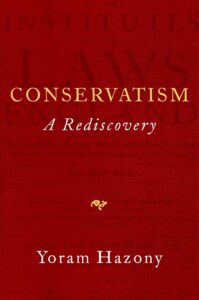This is the political philosophy class you didn’t take in college; actually, it’s probably better than the political philosophy class you didn’t take in college.
Conservatism: A Rediscovery by Yoram Hazony provides lots of information, draws very disconcerting conclusions, and asks disturbing questions – much of it politically incorrect by today’s definition. Which is the point. Hazony, chairman of the Edmund Burke Foundation and president of the Herzl Institute, is an unabashed proponent of British political philosophy and its conservative American extension, leading to the sort of representative democracy we have, and disdainful of American political liberalism.
And that’s OK, he posits. Politically incorrect thesis here: democracy is not for everyone. There is no “one size fits all” government – not democracy, not tribal rule, not theocracy, not royal rule – and so, to believe our British/American heritage works best for us is simply drawing a conclusion from his evidence.
The first two chapters are key – The English Conservative Tradition and American Nationalism. A deep dive into British history, governance, and political philosophy are essential to the American concept of government and the governed. That’s Chapter I.
Anglo-American traditionalists are those “who regarded national identity as rooted in the particular traditions of a people and expected newcomers to adopt these traditions as a prerequisite to becoming citizens.” “Traditions” are taken from the British and “groupness” is fundamental. That’s Chapter II.
Hazony makes two points: The Federalists – traditionalist, conservative in the sense of wanting to conserve the best of what came before them – believed that feeble government allowed the rise of despots because human society always stands at the edge of a precipice. And “at the time of the next great threat they will invariably cry out for the energies of the executive to be unleashed.” Hence the separation of powers – an executive hemmed in by the legislature and the Supreme Court – but holding the key to action in a crisis.
The “Confederationalist vision,” called “democratic republicanism,” became the Democratic Republican Party of Thomas Jefferson and Tom Paine. It opposed the British model of centralized government, believing society was “founded on the virtue and natural rights of the consenting individual, who owed little or nothing to national and religious tradition,” therefore relying primarily on local government except in times of emergency. It was a largely agrarian view, taking little account of people living closely together. Jefferson believed “the sum of good government” was to “restrain men from injuring one another” and otherwise leave them alone.
Hazony’s paradigm:
Liberalism = individual liberty, equality, consent, and reason.
Conservatism = nation and tribe, mutual loyalty, honor, hierarchy, cohesion and dissolution, influence, tradition, and constraint.
Liberalism appears easier, but in the US, the traditionalists won. For a while. For a long time, actually. Theirs was a national standard, assimilation of immigrants, and traditions rooted in the Protestant ethic imported from England. Their success was due to the Constitutional Convention of 1787. Many Americans today can trace their immigrant arrival (whether as slaves, free people, or refugees) and can tell the assimilation story of their parents, grandparents, or earlier ancestors. But fewer can explain assimilation as necessary to a unified grouping of states under one government. Hazony can.
That’s us. But for the first of the disconcerting questions, “What about the rest of the world? Wouldn’t it benefit from ‘democracy promotion’ as proffered by both the Bush (43) and Obama administrations? Wouldn’t everyone benefit from political parties, parliaments, presidents, and prime ministers?” Secretary of State Condoleezza Rice called freedom a “yearning in every human heart.” The Obama people wanted to “atone” for what they thought was white – and American – colonialism.
The American wrecking crew across Iraq, Afghanistan, and the so-called “Arab Spring” countries of Tunisia, Egypt, and Libya, should be the answer. American policy in Lebanon, during the Syrian civil war, Central America and more are add-ons. Coups and wars in Africa cement Hazony’s point that the British-generated, American modified form of government is not for everyone. And that is not necessarily a criticism of those others or their interests.
The failures, according to Hazony, were the result of a reemergence of Jeffersonian intellectual hegemony, and “democracy promotion” the result of what he calls “a liberal world order” in which liberals “have assumed that the various rights and liberties associated with the traditional Anglo-American constitution, developed and inculcated over centuries, are, in fact, dictates of universal human reason and will be recognized as desirable by all human beings.”
Not really. In fact, as the book progresses, Hazony shows far more respect for different people, different cultures and different religions than the “liberals.” WE think our way is better, but other people have communities, teachers, religions, and beliefs that THEY think are the best for ensuring the survival of their societies. They don’t have to believe ours are better. And they don’t. And why should they? There are people around the world who were appalled by American governmental institutions flying “pride” flags while much of the gay rights agenda is illegal in their countries and inimical to their religious/cultural patrimony. Want to judge them? Go ahead. They will judge you equally.
The underpinnings of the “liberal world order,” a universalist position, and the “conservative paradigm,” with its roots in the particularism of the British, is the central theme of Chapter III. The first believes that all individuals will come to the 10 Commandments and democratic principles by themselves; the second believes that without community, teaching, and discipline across generations, both will disappear.
Hazony spends a lot of the chapter on the obligations of citizens – which look a lot like the 10 Commandments (which he calls the Mosaic Ten Principles). “Honor,” as in “Honor your father and mother,” is huge and includes teachers and other community leaders.
“Not everyone is equal in deserving honor.” This is heresy in today’s society, in which “an insatiable egalitarianism of choices” makes all choices equally valid. Egalitarianism posits that the choices of people who marry, raise a family, work hard to support that family, serve in the military, don’t steal, don’t commit adultery, don’t lie, and/or do perform religious duties are not necessarily deserving of more honor than other choices, including shoplifting, urinating in the streets, drug use, tent-pitching, drug and hormone “therapy” for children, and failure to prosecute crimes on the assumption that the criminal will figure it out and become a law-abiding citizen.
Discipline, personal and governmental, is a key to freedom and democracy. The list of obligations for a citizen in actual “democracy promotion” is long. Have we lost the discipline the Founding Fathers believed necessary to hold a country together – or even to hold a society together – or even to hold a family together? Hazony is not a defeatist, but he recognizes that those who choose the “conservative” route will end up working harder. But the conservative empiricist – one who takes lessons from those/that which came before “are not less concerned with truth than their rationalist detractors. Indeed, they are better equipped to go about finding it.”
His recommendation is the restoration of religion, Chapter IV. Again, particularism rules. “After a certain point, we must leave off investigating what is true of all human societies and turn to the investigation of ideas and institutions that are the inheritance of certain nations and tribes.” Ours. This one is a good, deep dive into what is commonly called the “Judeo-Christian” ethic, the role of congregations, and the role of families within them.
But the book is not about religion, it is about governance. So, Chapter V.
The split: Liberals historically had believed the role of government was to be an overarching protector so that individuals could do what individuals wanted to do. The assumption being that they would do the right thing. Conservatives historically gave the government a role in keeping the tribes/states together. Some things do change.
People have always been governed. “They possessed customary law and traditional institutions such as councils and assemblies, which met intermittently to make political decisions and resolve rival claims and conflict. But they had no standing government …” The “state” or government “is a traditional institution under which a permanent alliance has been established among rival loyalty groups…This form of government commands a professional army and police capable of suppressing violence… and a professional bureaucracy capable of systematic taxation.”
That last bit may account for corruption in many, many places that had been unused to governments with standing bank accounts they could access – this may include our own country.
Hazony doesn’t go there – he is more concerned with the mechanism for ensuring the continuance of the government: tradition. “If appropriate traditions are not intensively and successfully cultivated, then the alliance among these rival tribes will end, and both the state and the government will cease to be.” That may account for wars in many parts of the world – but may include America’s possible national nervous breakdown as well. And Israel’s.
And, oddly, that of El Salvador.
What does one do with El Salvador? The president was democratically elected but proceeded on a wide-ranging arrest of criminals and gang members with nary a thought of their “rights.” His nationwide dragnet caught up tens of thousands – and also freed the law-abiding citizenry from a reign of terror with the highest murder rates in the Western world and an economy based on payoffs to drug lords. The people of El Salvador give very, very high marks of approval to their less-than-human-rights-or-prisoner-rights-oriented president. Now others in the region want to emulate him. The US is considering sanctioning El Salvador over its lack of democracy, but the citizens appear to care less about the government’s adherence to a set of rules imposed by the North and more about the rights of the people oppressed by criminals.
If the point is to defend the institution of “democracy,” there is one set of obligations. But if the point of government is to protect the people, there is another. Will the gangs and drug lords discover and embrace the Mosaic Ten Principles while killing, extorting, and stealing?
Chapters VI and VII bring the conversation into the 20th and 21st centuries. The rise of Adolf Hitler, Franklin D. Roosevelt said, “directly challenge(s) three institutions indispensable to Americans, now as always. The first is religion. IT is the source of the other two – democracy and international good faith.” Moving to the post-War period, into Reaganism and Thatcherism and out of it to “the end of history,” Hazony believes the liberal view has prevailed. The current challenges of Marxism – post-Soviet Marxism – gets (and deserves) a chapter to itself.
The last section (“Some Notes on Living a Conservative Life”) is Hazony’s description of himself, his family and his intellectual as well as physical journey from the United States to Israel. OK.
This is a fairly long and deep review of a very long and deep book. Be prepared. But do it – wherever you fall on the liberal/conservative spectrum, you will find yourself wanting to argue with Hazony. A better idea would be to take the principles of Conservatism and argue them with your friends and especially your political adversaries in search of that common ground that has held the United States together for nearly 250 years. And, perhaps for the next 250.
Shoshana Bryen is the editor of inFOCUS Quarterly and the Senior Director of the Jewish Policy Center.





